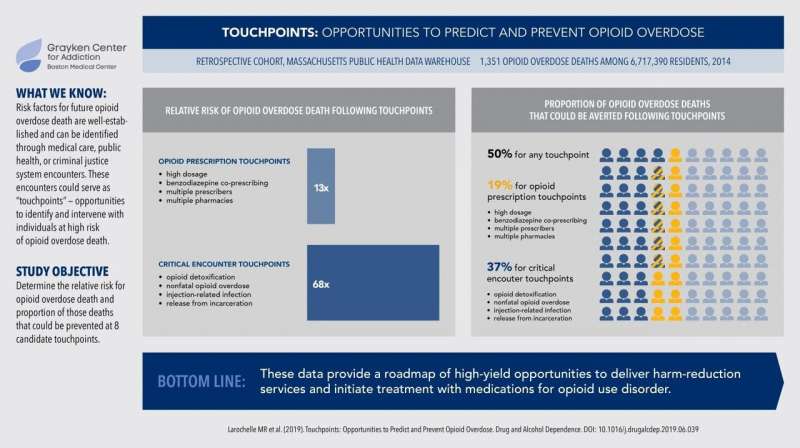Researchers identify focus points to reduce opioid overdose deaths

A new study identifies specific locations where medication and harm reduction services for people with opioid use disorder should be available in order to have the greatest impact on reducing opioid overdose deaths. Led by researchers at Boston Medical Center's Grayken Center for Addiction, the data show that more than half of those who died of an opioid overdose in Massachusetts encountered the health care, public health and/or criminal justice systems within the 12 months prior to their fatal overdose. These results, published in Drug and Alcohol Dependence, provide a roadmap to better reach these individuals at high risk of overdose and provide treatment and harm reduction services in order to reduce the number of overdose deaths.
For this retrospective cohort study, researchers set out to determine how and where individuals encounter the health care, criminal justice and public health systems in the 12 months prior to their fatal overdose. In collaboration with Massachusetts Department of Public Health, researchers examined eight data sets for persons over the age of 11 in Massachusetts between January and December 2014 with health insurance, as identified in the All-Payer Claims Database.
The researchers determined the relative mortality risk related to opioid overdose deaths through eight potential "touchpoints." Four opioid prescription touchpoints included individuals: taking high doses of opioids; co-prescribed opioids and benzodiazepines; and receiving or filling opioid prescriptions from multiple providers or multiple pharmacies. Four critical encounter touchpoints included individuals who: attended an opioid detoxification program; received medical attention for a nonfatal opioid overdose; sought treatment for an infection related to their injection drug use; or were recently released from incarceration.
Of 1,315 individuals who died from opioid overdose in 2014, 51.8 percent had at least one of the eight potential touchpoints with the health care, criminal justice or public health system in the 12 months prior to their death. Specifically, 20.5 percent of those who died of an overdose had an opioid prescription touchpoint encounter, and 37.3 percent had a critical encounter touchpoint. Of importance, the researchers note, is that overdose death was 12.6 times and 68.4 times more likely for individuals who had an opioid prescription and critical encounter touchpoint, respectively, compared to individuals who did not have a touchpoint.
"These data show that while opioid prescribing stewardship is an important goal, there are additional missed opportunities to provide harm reduction services and treatment for individuals at high-risk of opioid overdose death," said Marc Larochelle, MD, MPH, the study's lead author and a primary care physician specializing in addiction at Boston Medical Center. "We need to focus our efforts on ensuring that on-demand medication and harm reduction services, including overdose education and naloxone distribution, is available in these locations during these critical times so that we have the opportunity to reduce their risk of death by overdose."
In particular, individuals who were taking a high-dose of an opioid prescription had the highest mortality rates in the opioid prescription group, and those who experienced a nonfatal overdose had the highest risk of death by a future opioid overdose in the critical encounter group.
"If we can effectively deploy more targeted interventions that can reach those at highest risk of opioid overdose, we have the potential to eliminate up to 50 percent of those deaths in Massachusetts," said Larochelle, who also is assistant professor of medicine at Boston University School of Medicine.
"The opioid epidemic is claiming far too many lives in Massachusetts and across the country," said Public Health Commissioner Monica Bharel, MD, MPH. "We must continue to use data to focus our efforts where they are most effective, in partnership with researchers from academic, nonprofit, private and government agencies to respond to the opioid crisis."
More information: Marc R. Larochelle et al, Touchpoints – Opportunities to predict and prevent opioid overdose: A cohort study, Drug and Alcohol Dependence (2019). DOI: 10.1016/j.drugalcdep.2019.06.039


















